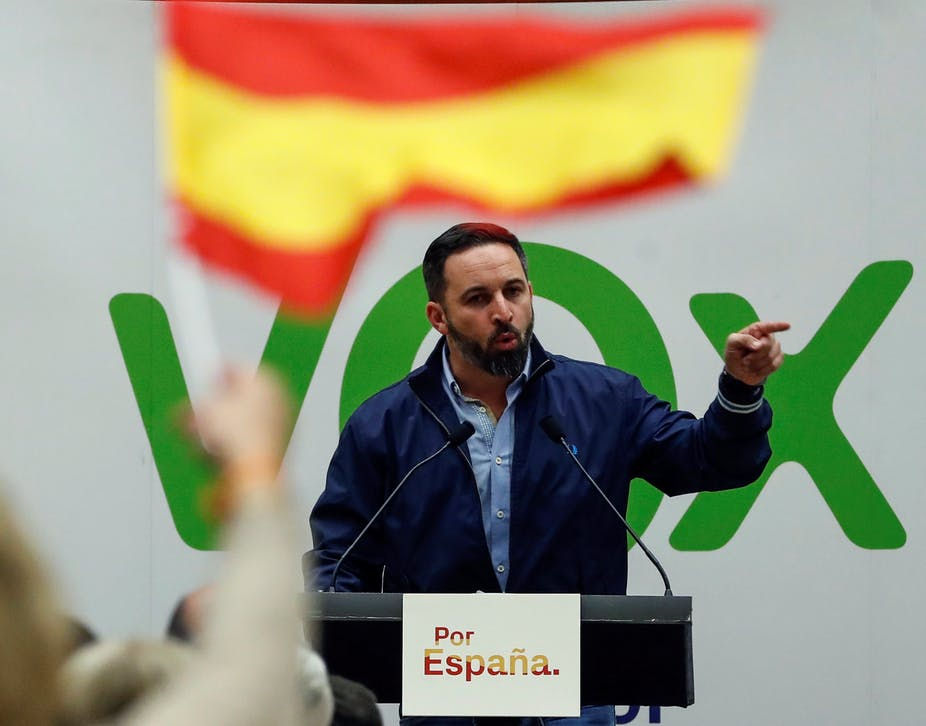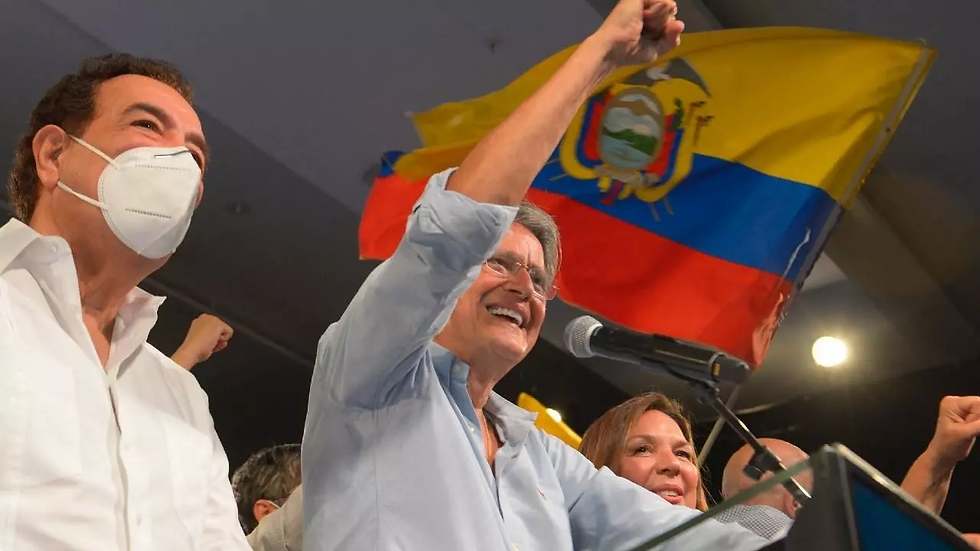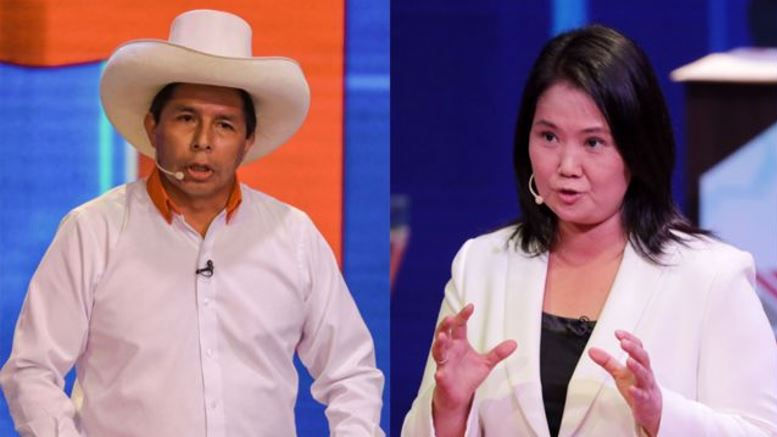Carta de Madrid: A different Devil but the same Hell
- Carlos Mosquera

- Jun 11, 2021
- 6 min read
The "Madrid Charter," which claims to be defending freedom and democracy in Ibero-American countries against communist and socialist totalitarian regimes, was signed on the 26th of October 2020 in Madrid, Spain, as a response to the Foro de Sao Paulo and Puebla Group. These are forums that are recognized for having political left-wing personalities of all Latin America, and are part of Latin American Socialism of the XXI century. The issue has now fallen in Ecuador, where members of the Spanish political party VOX (right-wing) and the Disenso Foundation (run by members of said party) have been visiting the country as part of the promotion process of Guillermo Lasso in Ecuador. The Madrid Charter has been widely discussed due to the recognition from political figures of the region, especially those from Venezuela and Argentina.
On May 31st, it was made public that the Ecuadorian political figures had signed the Charter, one of them being a former vice president. The reception on social media was mixed. Ecuadorian politicians publicly stated: "we reject a model (socialist and communist) that all that has done is destroy many countries”. The Charter aims to bring joint efforts of the signature countries to defend the rule of law, freedom of expression, private property, among other fundamental values.
So, what is the big fuzz around the Charter?
Why is the signature of this Charter so polemic? It is not due to the ideas it promotes, but instead because of who created it: VOX. This political party has similar proposals to those of the far-right parties in Europe, such as Alternative for Germany (AfD), the Italian North League led by Matteo Salvini or the National Front of Marine Le Pen. Nevertheless, the party's leadership does not recognize the designation of "extreme right" as the development of "extreme need."
Some of the measures proposed by VOX are the construction of a wall in the Spanish Cities of Ceuta and Melilla, the deportation of illegal or legal migrants who committed crimes or the suspension of free movement of Europeans. Furthermore, The Vox Party is famous for its strong stance on subjects like nationalism, weapons transportation, migration, ecology and the policy on equal opportunities.

The principles themselves do not represent a particular philosophy as advocated by the signatories and architects of the Madrid Charter. The same letter notes that it is backed with distinct and even contradictory points of view and ideas by many political and social figures. The Spanish objectives are to defend freedom, unity and sovereignty and the rule of law, life, family and justice. And "the reinforcement of Spain's cultural inheritance of Western culture throughout the globe and its vocation in Europe and America". Most of the signatories in Ecuador have something in common: they are on the conservative right and as such, the VOX leadership is searching for sympathizers and allies on a global level.
Something similar happened in Ecuador when the "Revolución Ciudadana" came to power in 2007 with Rafael Correa. The difference was that the visitors were figures of prominent tendencies of that time, like Hugo Chavez or Evo Morales. Since then, the country opened to many advisers of the Spanish left party Podemos, in which they settled in Ecuador with Correa's government. Podemos expanded their horizons to all the countries with left-wing tendencies.
This Spanish party was implicated in creating the Foro de Sao Paulo, the Puebla Group, and the UNASUR. These three were forums for Latin American left, centre-left, and extreme-left political parties and groups, from reformists to revolutionary left-wing political collectives in Latin America. Such an example is the Brazilian Workers Party founded in Sao Paulo in 1990. The forums coordinated the left-wing politics of Latin America. They attempted to further push their objectives in Europe. However, they have been somewhat stopped by the supporters of the Madrid Charter, as they were called upon to fight by the Disenso Foundation.
The rupture between Lenin Moreno and Correa in 2017 and the fall of the left-wing governments in Latin America made the influence of Podemos lower. Additionally, VOX is beginning and trying to win space and allies in the region.
The proponents of the Madrid Charter say that the letter will now be signed by additional leaders and citizens in the western world. In promoted the Charter, they've stated that the supporters do not absolutely have to be conservative. They recognize that the left-wing policy they push from the Forums, as mentioned above, is insufficient to satisfy them. It is thought that these groups selected Podemos to convey their views in Spain, and they have to struggle with the left in this ideological space.
My Opinion
Is it wrong that Ecuadorian politicians sign a letter from representatives of VOX? Naturally. Several Ecuadorian politicians are associated with a party whose reality is quite apart from ours and whose discourses are xenophobic, anti-immigrant and critical of everybody. The disparities between the political situation in Ecuador and Spain are profound. There is, thus, no value in risking political capital by attaching you to such a group unless your purpose was to obtain public knowledge and media attention with this (what they did).
Political speech and ideology are trivialized. Some label you a communist, others a fascist, harsh and twisting ideas that few know or can define in entirely different circumstances. In the end, they want the other not to be a democratic opposite but to be an enemy to kill. We are making dehumanizing them.
Should we worry ourselves about an organization such as VOX, to have a big geopolitical impact in our region? I believe that, before looking beyond the political elite, we should agree on a vision of the nation; we ought to reject every type of foreign intervention. We are continually searching outside to get into any ideological craze in the face of our lack of identity and ideological disorientation. The Puebla Group and the Forum Sao Paolo, as well as geopolitical organizations with specified interests that are also intended to affect our countries, are now being tried by VOX.
Human rights protection transcends political parties or philosophies. If you criticize the Madrid Charter, but defend the Maduro's administration, demonstrates that you are concerned about imposing your ideology rather than human rights. I've heard a lot this week about the threats of fascism, but do not forget that we already have authoritarian regimes in the region who violate people's rights and perpetrate state crimes on a daily basis. Yes, you may criticize a foreign party's extremist and anti-democratic language, but you should also do the same for governments' actions which damage daily our neighboring nations.

It seems evident to me that a bubble foreign to Ecuador's great reality is the country's political class and the political media elite, whose preferred social network is Twitter. This argument has allowed the press and Twitter trends to focus for a week on a foreign party program that is not known by the great majority of Ecuadorians and which has no effect on their lives. In the meantime, we have today dropped the main concerns like vaccine failure, societal unrest, and protest breakouts around the country.
For this reason, I am sure that the groups associated with the Madrid Charter achieved their objective, to attract attention. After all, they are initially marginal political groups that live off attention and notoriety; that's how they emerged in the US with Trump, in France, etc. Attention is mainly channelled through attacks; they seek to provoke people in order to generate reactions and stay permanently in the media, set the agenda and spread their message in this way. The attacks and those who reject them are the majority, of course, but for every five attacks, surely there will be a young person who hears that message and wants to approach these groups. It is their way of existing, giving them attention, stoking the fire, naming them at every moment even if it is to reject them. It only makes them stronger.
Finally, I want to say that the Carta de Madrid and the reaction caused by it in the country are symptoms of something much bigger. We are polarized, and we are all guilty of that. We are a black and white society. We see those who think differently as morally inferior, we believe we are masters of the absolute truth, and the political/ideological rival is not a rival or adversary. He becomes an enemy that we want to destroy. After all, if they hate us and threaten us, we better destroy them first before they destroy us. Hate speech and polarization do not stop, empowered by networks that, although they are the most wonderful tool of this time, become a platform for hatred and more fanaticism. History teaches us that hate cycles are not broken with more hate; someone must take the first step to break the vicious cycle.
I understand that many will not like this opinion, finding the balance is complex because it confronts you with both extremes. I clarify that it is my personal opinion and does not reflect the position of this page or of the other administrators, just as many of their positions do not reflect mine. I hope that the divergence of thought stops translating into polarization and we begin to build, because the challenge we have to fix our society is immense. Although it is difficult, the famous "meeting" must stop being a speech and become reality.



Comments